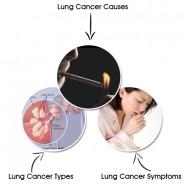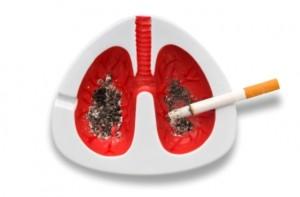
Lung cancer is the deadliest of all the other types of cancers. Though it takes years to develop, it is difficult to detect it in the early stages of its emergence. Only when it is in the later stage of its growth, that it shows signs or symptoms in the body but up to this time it becomes too late to treat it as it also spreads to other critical organs like brain, liver, adrenaline glands and bones. We will discuss the types and varieties of the lung cancer through this article along with the treatment procedures to be adopted to treat it successfully.
Definition
Lung cancer is the result of malignant cells forming in the tissues of the lung, generally in the cells lining the air passages. The cells in our bodies are continuously dividing and reproducing. Generally, there’s an orderly pattern to this reproduction as cells produce and specialize to meet certain desires. Occasionally, even so, a cell becomes damaged. There’s a mutation in its DNA, and rather than maturing and dying as is typical, it continues to reproduce unchecked. In essence, this is cancer – uncontrolled reproduction and development of abnormal cells in the physique.
Types
There are two main types of lung cancer
- Tiny Cell Lung Cancer which is less typical (SCLC)
- Non-Modest Cell Lung Cancer (NSCLC)
Little Cell Lung Cancer is far more deadly. It’s straight linked to cigarette smoking – only less than 1% of SCLC is diagnosed in non-smokers. It’s also really aggressive and quickly-moving, metastasizing quickly to other organs, and frequently undiscovered till it is currently widespread.
Non-Little Cell Lung Cancer, on the other hand, is far more typical, accounting for almost 80% of all diagnosed lung cancers. There are 3 principal varieties of non-tiny cell lung cancer, usually characterized by the size, shape, and chemical composition of the cells that type the cancer:
-
Squamous Cell Carcinoma (also referred to as Epidermoid Carcinoma)
This accounts for about 25% – 30% of all lung cancers, and is linked with a history of smoking. This cancer is virtually usually identified in the central chest region, close to the bronchus.
-
Adenocarcinoma (also referred to as Bronchioloalveolar Carcinoma)

Lung cancer – Types, Causes & Symptoms
This accounts for about 40% of all lung cancers, and is discovered in the external region of the lung. Remedy for this kind of lung cancer frequently leads to a far more productive outcome than that of other lung cancers.
-
Huge-Cell Undifferentiated Carcinoma
This account for only 10% – 15% of lung cancers, this kind may possibly show up in any region of the lung. It tends to spread rapidly, and typically final results in a poor prognosis.
It is also probable for lung cancer to be a mixture of Non-Tiny Cell Lung Cancer varieties.
Others
There are other, much less frequent sorts of lung cancer.
- Bronchial carcinoids are little tumors usually discovered in folks underneath 40 years of age. They have a tendency to develop gradually, and be amenable to remedy.
- Carcinoid tumors account for roughly 5% of lung tumors. Some are non-cancerous. The other people are usually slow-growing and can be efficiently treated with surgery.
- Some cancers found in the lungs aren’t lung cancers at all. Considering that the lungs are prone to metastatic cancers, it is not uncommon for tumors from other main cancers to locate their way to the lungs. When this happens, the tumors are usually found in the peripheral tissues of the lungs rather than in the central tissues.
Common Signs and Symptoms of Lung Cancer
- A cough that doesn’t go away and gets worse over time
- Constant chest pain
- Coughing up blood
- Swelling of the neck and face
- Loss of appetite
- Fatigue
- Fever
- Weight loss
- Shortness of breath, wheezing, or hoarseness
- Repeated problems with pneumonia or bronchitis.
Other symptoms that can sometimes occur may include:
- Changes in the shape of the fingertips
- Swollen or enlarged lymph nodes (glands) in the upper chest and lower neck.
Lung Cancer Causes: An Overview
Researchers have discovered several causes of lung cancer, but the most common are related to the use of tobacco. This includes tobacco from:
- Cigarettes
- Cigars and pipes
- Environmental tobacco smoke (also known as secondhand smoke).
Other possible causes of the disease include:
- Radon
- Asbestos
- Pollution
- Lung diseases
- Personal history.
Lung Cancer Treatment
- Surgery
- Chemotherapy
- Radiation therapy
- Photodynamic therapy
The type of treatment recommended by the healthcare provider will depend on several factors, including the type of lung cancer; the size, location, and extent of the tumor; and the general health of the patient. Lung cancer treatment is generally provided by a healthcare team, including specialists such as
- Pulmonologists
- Surgeons
- Medical oncologists.
Important
- The treatment generally begins within a few weeks of diagnosis.
- Lung cancer diagnosis leaves the patient in the shock and he or she forgets to ask the questions. Hence make a list of all the relevant questions you need to ask before consulting your doctor on the treatment plan.
- Take notes of the questions asked and answers received on them by the doctor for your record
- Chose an appropriate treatment plan while siting with the doctor and the family members
- There will be time with the patient to talk to the doctor and take the second opinion before starting the treatment.
Conclusion
Lung cancer is the menace and detection of this disease leave the patient with depression and challenge in the life ahead. Hence one has to learn to cope with this and consult patiently with his or her doctor about the relevant treatment choice. Remaining positive always helps in getting healed early and successfully.
